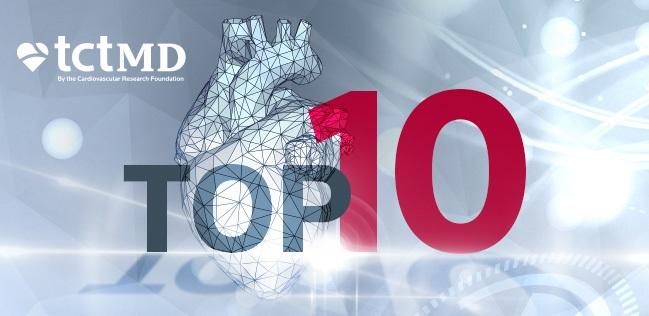TCTMD’s Top 10 Most Popular Stories for May 2018
News from the SCAI, HRS, and EuroPCR meetings garnered a lot of interest, but the biggest hit by far was the FDA approval of andexanet alfa.

TCTMD’s on-the-ground meeting coverage grabbed many of the top slots this month. Stories from the Society for Cardiovascular Angiography and Interventions (SCAI) 2018 Scientific Sessions, which took place in late April, continued to hold our readers’ interest, while more recent news rolled in from the Heart Rhythm Society 2018 Scientific Sessions and EuroPCR 2018. The month of May also offered an in-depth look at the challenges facing the Impella (Abiomed) mechanical circulatory support device in acute MI cardiogenic shock; many clinicians are awaiting a large RCT, while others have faith in observational data.
But the number one story by far was the US Food and Drug Administration’s approval of andexanet alfa, the first antidote for factor Xa inhibitors.
Andexanet Alfa, First Reversal Agent for Factor Xa Inhibitors, Finally Gains FDA Approval
The agent is the second antidote approved for the NOACs, joining idarucizumab, dabigatran’s reversal agent.
CABANA Misses Primary Endpoint, but Electrophysiologists See Support for Ablation
The “as-treated” analysis may validate what EPs hoped to see, but experts in other specialties say the results should spur discussion and be clearly conveyed to patients.
ORBITA Continues to Surprise: 85% of Sham Arm Opted for PCI When Trial Ended
A discussion at SCAI 2018 tackled lingering ORBITA issues, with experts finally grasping a detail the PI says she’s been emphasizing from the outset.
Injured and Sleep Deprived: Are the Physical Tolls of Interventional Cardiology Too High?
One physician says it may be time to unionize. Another warns that while lost sleep may not affect hard outcomes, it raises the risk of errors and accidents.
NOACs Perform Worse Than Warfarin in Real-World Study, Especially When Adherence Is Low
Pointing to the shortcomings of analyzing administrative data sets, experts held back on drawing firm conclusions about the surprising findings.
Thrombus on the Watchman LAA Occluder Tied to Higher Stroke Risk
Device-related thrombus mitigates the benefits of LAA closure relative to warfarin, but not relative to doing nothing at all, one expert says.
To RCT or Not to RCT? Impella Debate Pivots on How Best to Study Patients on the Brink of Death
Cardiologists must weigh real-world evidence against scarce randomized data when making a snap decision in critically ill cardiogenic shock patients, experts say.
Two Sham-Controlled Renal Denervation Studies Offer Hope in Hypertension
Larger clinical trials are in the works, but investigators and others gathered at EuroPCR 2018 said the data breathe new life into this once promising field.
EuroPCR 2018: Stable CAD, Functional Tests, and Renal Denervation Take Center Stage
The focus for 2018 is “to insist on best practices,” said William Wijns. Yes, this embraces new gadgets, but also optimal pre- and postprocedure care.
The new data may be hard for some to “get their head around” but hint that the link between ischemia and symptoms is only partially understood.
Caitlin E. Cox is Executive Editor of TCTMD and Associate Director, Editorial Content at the Cardiovascular Research Foundation. She produces the…
Read Full Bio

Comments